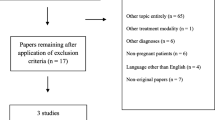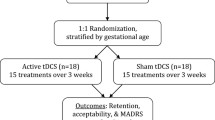Abstract
The treatment of major depressive disorder during pregnancy is an important but complex clinical topic. Medications, electroconvulsive therapy, and psychotherapy are all reasonable choices, but each has its limitations. In this article, we propose that a novel device technology known as repetitive transcranial magnetic stimulation should be systematically studied as a potential treatment option for women with major depressive disorder during pregnancy.
Similar content being viewed by others
References and Recommended Reading
Halbreich U: Prevalence of mood symptoms and depressions during pregnancy: implications for clinical practice and research. CNS Spectr 2004, 9:177–184.
Hoffman S, Hatch MC: Depressive symptomatology during pregnancy: evidence for an association with decreased fetal growth in pregnancies of lower social class women. Health Psychol 2000, 19:535–543.
Marcus SM, Barry KL, Flynn HA, et al.: Treatment guidelines for depression in pregnancy. Int J Gynaecol Obstet 2001, 72:61–70.
Vesga-Lopez O, Blanco C, Keyes K, et al.: Psychiatric disorders in pregnant and postpartum women in the United States. Arch Gen Psychiatry 2008, 65:805–815.
Flynn HA, Chermack ST: Prenatal alcohol use: the role of lifetime problems with alcohol, drugs, depression, and violence. J Stud Alcohol Drugs 2008, 69:500–509.
Hanna EZ, Faden VB, Dufour MC: The motivational correlates of drinking, smoking, and illicit drug use during pregnancy. J Subst Abuse 1994, 6:155–167.
Marcus SM, Flynn HA, Blow FC, Barry KL: Depressive symptoms among pregnant women screened in obstetrics settings. J Womens Health (Larchmt) 2003, 12:373–380.
Newport DJ, Levey LC, Pennell PB, et al.: Suicidal ideation in pregnancy: assessment and clinical implications. Arch Womens Ment Health 2007, 10:181–187.
Dayan J, Creveuil C, Marks MN, et al.: Prenatal depression, prenatal anxiety, and spontaneous preterm birth: a prospective cohort study among women with early and regular care. Psychosom Med 2006, 68:938–946.
Kelly RH, Russo J, Holt VL, et al.: Psychiatric and substance use disorders as risk factors for low birth weight and preterm delivery. Obstet Gynecol 2002, 100:297–304.
Li D, Liu L, Odouli R: Presence of depressive symptoms during early pregnancy and the risk of preterm delivery: a prospective cohort study. Hum Reprod 2009, 24:146–153.
Steer RA, Scholl TO, Hediger ML, Fischer RL: Selfreported depression and negative pregnancy outcomes. J Clin Epidemiol 1992, 45:1093–1099.
Bonari L, Pinto N, Ahn E, et al.: Perinatal risks of untreated depression during pregnancy. Can J Psychiatry 2004, 49:726–735.
Deave T, Heron J, Evans J, Emond A: The impact of maternal depression in pregnancy on early child development. BJOG 2008, 115:1043–1051.
Forman DR, O’Hara MW, Stuart S, et al.: Effective treatment for postpartum depression is not sufficient to improve the developing mother-child relationship. Dev Psychopathol 2007, 19:585–602.
Grace SL, Evindar A, Stewart DE: The effect of postpartum depression on child cognitive development and behavior: a review and critical analysis of the literature. Arch Womens Ment Health 2003, 6:263–274.
Hollins K: Consequences of antenatal mental health problems for child health and development. Curr Opin Obstet Gynecol 2007, 19:568–572.
McGrath JM, Records K, Rice M: Maternal depression and infant temperament characteristics. Infant Behav Dev 2008, 31:71–80.
Moehler E, Brunner R, Wiebel A, et al.: Maternal depressive symptoms in the postnatal period are associated with long-term impairment of mother-child bonding. Arch Womens Ment Health 2006, 9:273–278.
Bonari L, Koren G, Einarson TR, et al.: Use of antidepressants by pregnant women: evaluation of perception of risk, efficacy of evidence based counseling and determinants of decision making. Arch Womens Ment Health 2005, 8:214–220.
Cohen LS, Altshuler LL, Harlow BL, et al.: Relapse of major depression during pregnancy in women who maintain or discontinue antidepressant treatment. JAMA 2006, 295:499–507.
Flynn HA, Blow FC, Marcus SM: Rates and predictors of depression treatment among pregnant women in hospital-affiliated obstetrics practices. Gen Hosp Psychiatry 2006, 28:289–295.
Wisner KL, Zarin DA, Holmboe ES, et al.: Risk-benefit decision making for treatment of depression during pregnancy. Am J Psychiatry 2000, 157:1933–1940.
ACOG Committee on Practice Bulletins-Obstetrics: ACOG Practice Bulletin: clinical management guidelines for obstetrician-gynecologists number 92, April 2008 (replaces practice bulletin number 87, November 2007). Use of psychiatric medications during pregnancy and lactation. Obstet Gynecol 2008, 111:1001–1020.
Boucher N, Bairam A, Beaulac-Baillargeon L: A new look at the neonate’s clinical presentation after in utero exposure to antidepressants in late pregnancy. J Clin Psychopharmacol 2008, 28:334–339.
Chambers CD, Hernandez-Diaz S, Van Marter LJ, et al.: Selective serotonin-reuptake inhibitors and risk of persistent pulmonary hypertension of the newborn. N Engl J Med 2006, 354:579–587.
Kallen B, Olausson PO: Maternal use of selective serotonin re-uptake inhibitors and persistent pulmonary hypertension of the newborn. Pharmacoepidemiol Drug Saf 2008, 17:801–806.
Suri R, Altshuler L, Hellemann G, et al.: Effects of antenatal depression and antidepressant treatment on gestational age at birth and risk of preterm birth. Am J Psychiatry 2007, 164:1206–1213.
Spinelli MG, Endicott J: Controlled clinical trial of interpersonal psychotherapy versus parenting education program for depressed pregnant women. Am J Psychiatry 2003, 160:555–562.
St-Andre M: Psychotherapy during pregnancy: opportunities and challenges. Am J Psychother 1993, 47:572–590.
Anderson EL, Reti IM: ECT in pregnancy: a review of the literature from 1941 to 2007. Psychosom Med 2009, 71:235–242.
Rabheru K: The use of electroconvulsive therapy in special patient populations. Can J Psychiatry 2001, 46:710–719.
Klirova M, Novak T, Kopecek M, et al.: Repetitive transcranial magnetic stimulation (rTMS) in major depressive episode during pregnancy. Neuro Endocrinol Lett 2008, 29:69–70.
Nahas Z, Bohning DE, Molloy MA, et al.: Safety and feasibility of repetitive transcranial magnetic stimulation in the treatment of anxious depression in pregnancy: a case report. J Clin Psychiatry 1999, 60:50–52.
Lisanby SH, Kinnunen LH, Crupain MJ: Applications of TMS to therapy in psychiatry. J Clin Neurophysiol 2002, 19:344–360.
Lisanby SH: Update on magnetic seizure therapy: a novel form of convulsive therapy. J ECT 2002, 18:182–188.
Gross M, Goyal M: Central therapeutic effects of peripheral vagus nerve stimulation. Am J Electroneurodiagnostic Technol 2007, 47:47–52.
O’Reardon JP, Solvason HB, Janicak PG, et al.: Efficacy and safety of transcranial magnetic stimulation in the acute treatment of major depression: a multisite randomized controlled trial. Biol Psychiatry 2007, 62:1208–1216.
Janicak PG, O’Reardon JP, Sampson SM, et al.: Transcranial magnetic stimulation in the treatment of major depressive disorder: a comprehensive summary of safety experience from acute exposure, extended exposure, and during reintroduction treatment. J Clin Psychiatry 2008, 69:222–232.
Coverdale JH, McCullough LB, Chervenak FA: The ethics of randomized placebo-controlled trials of antidepressants with pregnant women: a systematic review. Obstet Gynecol 2008, 112:1361–1368.
George MS, Nahas Z, Kozel FA, et al.: Mechanisms and state of the art of transcranial magnetic stimulation. J ECT 2002, 18:170–181.
Veliskova J: The role of estrogens in seizures and epilepsy: the bad guys or the good guys? Neuroscience 2006, 138:837–844.
Morrell MJ: Epilepsy in women: the science of why it is special. Neurology 1999, 53:S42–S48.
Nau H, Kuhnz W, Loscher W: Effects of pregnancy on seizure threshold and the disposition and efficacy of antiepileptic drugs in the mouse. Life Sci 1985, 36:663–669.
Szuba MP, O’Reardon JP, Evans DL: Physiological effects of electroconvulsive therapy and transcranial magnetic stimulation in major depression. Depress Anxiety 2000, 12:170–177.
Reid PD, Pridmore S: Dexamethasone suppression test reversal in rapid transcranial magnetic stimulation-treated depression. Aust N Z J Psychiatry 1999, 33:274–277.
Author information
Authors and Affiliations
Corresponding author
Rights and permissions
About this article
Cite this article
Kim, D.R., Gonzalez, J. & O’Reardon, J.P. Pregnancy and depression: Exploring a new potential treatment option. Curr Psychiatry Rep 11, 443–446 (2009). https://doi.org/10.1007/s11920-009-0067-0
Published:
Issue Date:
DOI: https://doi.org/10.1007/s11920-009-0067-0




